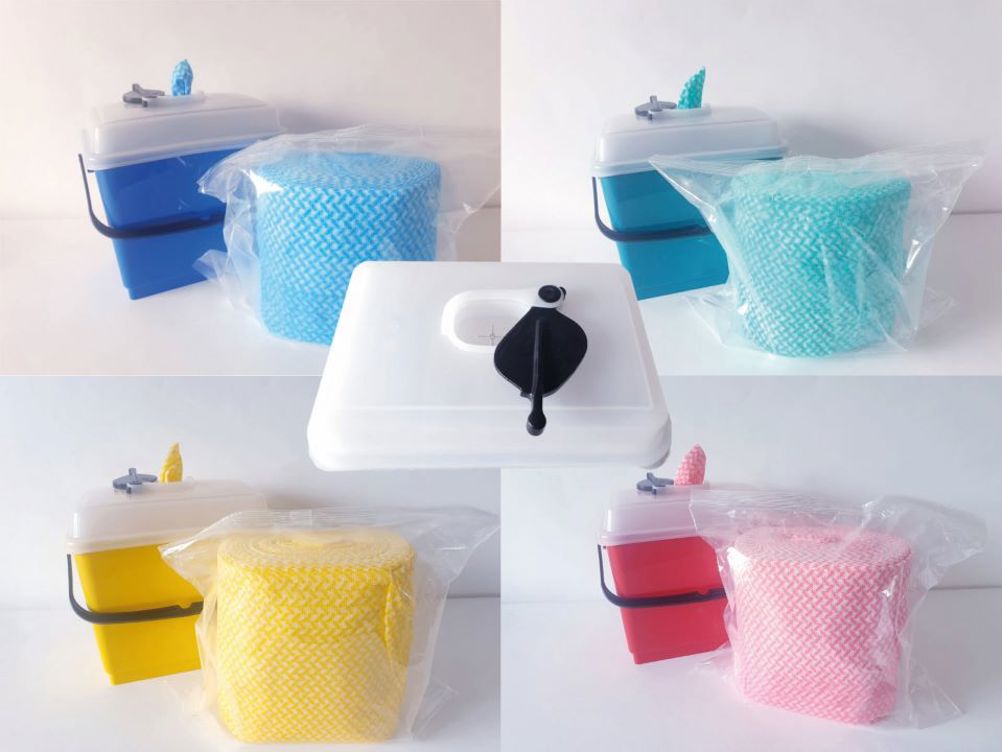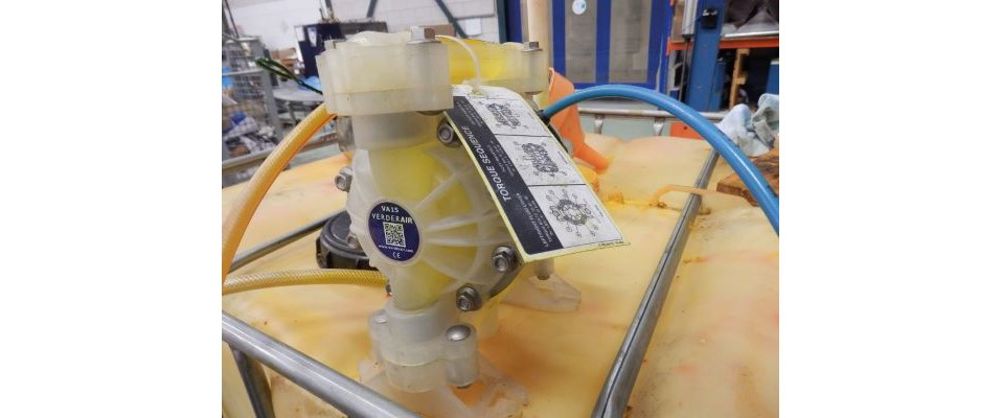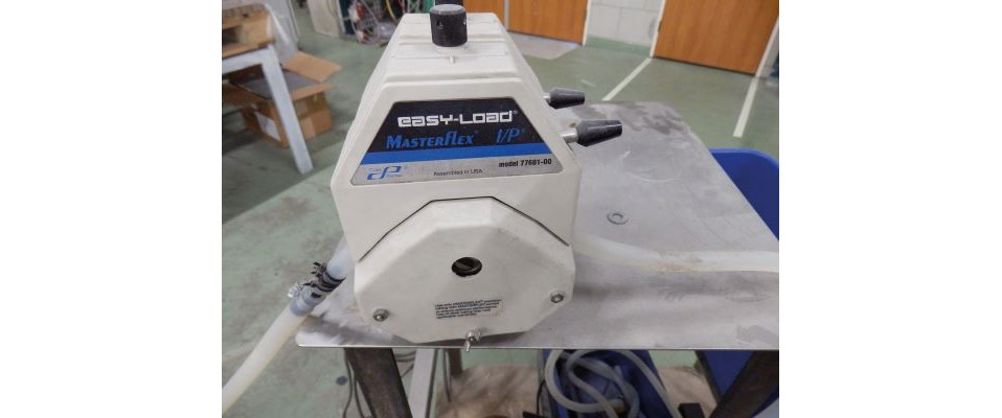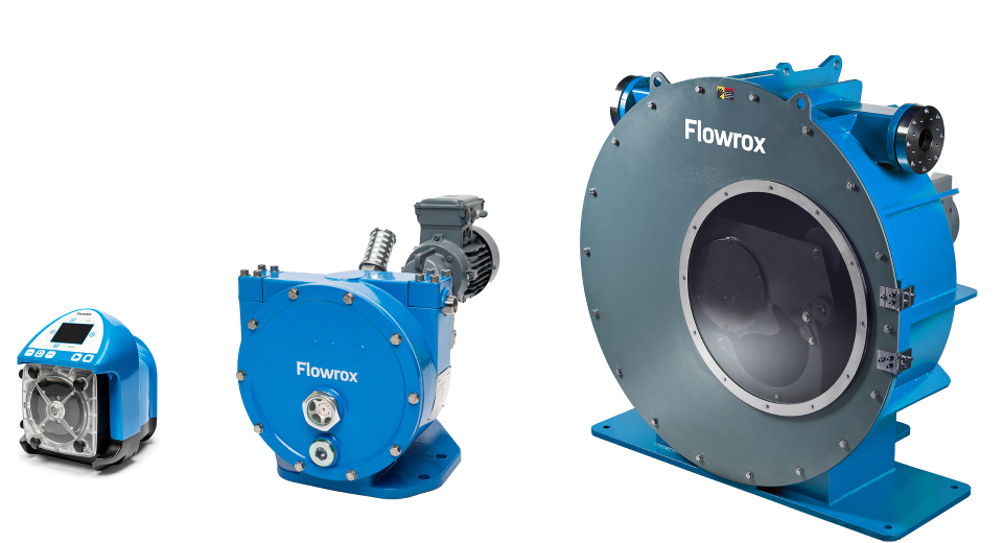Hewitex Nederland produces wipes and floor mops for professional use, mostly for cleaning hospitals, but also schools, airport terminals and other public spaces. For the products, the firm cuts and laminates cloth, and impregnates it with a vast array of fluids, some of which are highly corrosive. How do you ensure the reliability of the pump systems in such a factory? The director of the company shares her insights.
Diana de Kreij is the co-owner of Hewitex Nederland: “My sister Els and I have taken over the company founded by our parents in 1982.” She has been working for the firm since 1990 and takes care of machine design, product development, marketing and sales.
“We use pumps to bring fluids from containers to the machines making the wipes and mops,” she explains. “For example, nonwovens from 14 gram/m2 to 300 gram/m2 are impregnated with soap and ultrasonically laminated between two other layers to make floor mops. The end-user only has to add water. We also have products that stay moist, like baby wipes and such.”
Every product is optimized for its purpose and can be made up of layers of polypropylene, viscose, cellulose, paper, etc. Many different fluids with varying viscosities and corrosiveness are processed, from non-allergenic baby fluids, soaps, and medicinal-grade mineral oil to ethanol, isopropyl alcohol, hydrogen peroxide and anti-graffiti-fluids, depending on what the client and the end-use requires.

External pumps
Most production machines were designed, developed, and built in-house and none of them contain any pumps. “All our pumps are external so we can replace them quickly,” de Kreij says.
“We have spares for every pump and if they fail, we can repair them in our workshop while the machine keeps producing. The pumps are very reliable if you look after them: some have been in constant use for more than 25 years. If they do fail, it’s usually due to a blockage because of contamination, for example fibers getting into the pump, or chemical degradation.”
Different types of pumps are available. “Piston pumps are used if high quantities have to be pumped quickly,” de Kreij explains. “Some pump the fluid from the pallet tank straight to the nozzles to impregnate the end-product, others fill buffer tanks on top of the machines. And for our main production of oil impregnated wipes, we have a central white mineral oil distribution system with a 6,000 liter container and an electric pump constantly filling buffer tanks throughout the factory.”
Many machines use gravity instead of a pump to add the fluid to the product, as de Kreij explains: “A valve under the buffer tank opens a predetermined period, metering the fluid that drops onto the wipe. That can be accurately controlled and is fast enough, but not so fast that you have to prevent the fluid from foaming or splashing around. A float in the buffer tank controls the flow of the external pump.”

Most pumps are powered by compressed air instead of electricity. That’s safer and more convenient in an environment with lots of fluids. Energy can be stored in receiver tanks, and the pumps can be controlled by simple actuators that close the pump’s air supply. Some of the pumps are controlled by a PLC.
Handling corrosive fluids
For the corrosive fluids, peristaltic pumps are mostly used. There you don’t run just the fluid through the pump, but the whole hose carrying the fluid. A roller squeezes the hose and pushes the fluid forward. These pumps are all fully electric and can be programmed. “They are slower than the piston pumps,” de Kreij comments. “But you can solve that by placing two or more in parallel.”
Sometimes piston pumps have to be used for fluids that can degrade their materials. De Kreij’s advice is: “Make sure you don’t have rubber seals and keep checking the pumps. Once, we noticed black slivers appearing on a product, and the pump starting to leak. That was because the rubber seals were broken down by the fluid. Hydrogen peroxide and ethanol attack rubber. We replaced them with silicone seals, which made the pumps useable for ethanol up to 70%. But we still can’t use them for hydrogen peroxide, because when we tried that, the pumps started to seize up,” she says.

Staying vigilant
Even if you do use peristaltic pumps, you must stay vigilant, as de Kreij explains: “When we started processing anti-graffiti fluid, to our surprise we noticed black slivers again and the transparent silicone hose turned foggy on the inside. It turned out the black plastic nozzles were breaking down. So we replaced those. As for the hose turning foggy, the fluid supplier recommended using automotive fuel hoses or living with the transparent silicone degrading faster than usual. Since we need to be able to check for air bubbles and foaming, we decided to just replace the hoses more frequently. We have hoses for every type of fluid and they all have their date stamped on. If they are too old, show signs of wear, turn foggy, or became less flexible, we replace them.”
Whenever a product with a different type of fluid has to be produced, the hoses and pumps are changed and the machine lines are rinsed or cleaned. “Fortunately, tap water is very clean in the Netherlands, so we can flush them with hot water,” De Kreij comments.
“And we process fluids in a strict order. We only process baby fluid after the machine has been thoroughly cleaned. Then we go on to process chemicals from the lowest concentrations to the highest,” she adds.
Many types of fluids have been processed by Hewitex over the years, but de Kreij does draw a line: “If it’s too corrosive, we don’t process it out of concern for the safety of our employees. We don’t do chlorine for example. Also it would corrode the stainless steel our machines are made of,” she concludes.
Peristaltic pumps for chemical pumping
Peristaltic pumps, such as the Flowrox range from process technology firm Valmet, are an excellent solution for pumping a variety of chemicals, since the rubber elastomer hose is the main component in contact with the medium. Small metering pumps utilize thermoplastic elastomer tubes, which offer safe and accurate dosing and excellent chemical resistance to a wide range of chemicals, whereas larger peristaltic pumps utilize rubber hoses with good mechanical wearing properties. Long hose lifetime can be achieved by knowing the application and choosing the correct hose material.
If the hose material is not chemically compatible with the medium, the rubber can degrade rapidly and cause premature hose failure. Peristaltic pumps are ideal for dosing since they have accurate flow and intelligent controllability for different kinds of controlling systems. These pumps are ideal to replace jamming membrane pumps in chemical, P&P plants and other industries where chemicals are used. They are self-priming and a great choice also for suction lift applications as they can also run dry without harming the pump.

About the author
This article was written by Django Mathijsen
This article first appeared in the March/April 2024 issue of World Pumps magazine. To read the full issue, click here.







